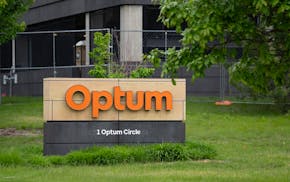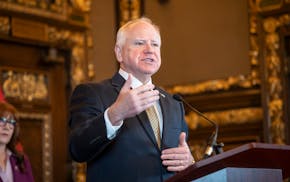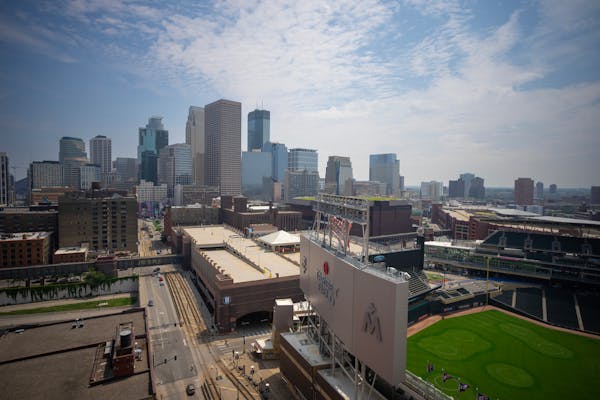Downtown Minneapolis office buildings have quickly lost value in the past couple years, but some investors are now seeing that as an opportunity.
LaSalle Plaza, a 30-story office tower in downtown Minneapolis, sold this week for about half its estimated tax value, making it one of the first high-profile office buildings to trade hands since the pandemic's onset.
Twin Cities-based Hempel Real Estate bought the stone and glass tower at 800 LaSalle Av. and plans to invest millions in upgrades and new amenities for building tenants, including a private car service and an indoor pickleball court taking up part of a vacant restaurant space.
A vote of confidence for the future of downtown's office buildings, the sale is also a reflection of just how much damage the pandemic dealt to the once-thriving commercial real estate sector.
"We want to take a strong position [in the downtown office sector]," Hempel CEO Josh Krsnak said. "We feel now is the time where the market is starting to reset to a basis where the market now makes sense."
Like other downtown buildings, the value of LaSalle Plaza has fallen since the start of the pandemic. In 2020 — payable in 2021 — the tower's value peaked at a bit more than $103 million, according to Hennepin County property records.
A source close to the deal said the building sold for $46 million, well below its current estimated market value of $87 million.
Hempel essentially bought the debt from Milwaukee-based Northwestern Mutual, which took possession from the previous owner, Teachers' Retirement System of the State of Illinois. So the deal's terms are not public.
Krsnak said while he has no doubt the building is now a value, it took months to find lenders willing to finance the purchase.
"I flew all over the country," he said. "They said 'office' is a four-letter word."
According to recent data from the city assessor, the most expensive downtown office buildings in the Central Business District (CBD) are tumbling in value, draining millions of dollars of property tax revenue from the city.
Krsnak said the building was too good to pass up, even though office vacancies in the city's CBD are now hovering at record highs.
"We've been sitting on the sidelines waiting for the market to adjust," Krsnak said. "Prices were getting frothy."
Until 2015, Hempel owned several office buildings, some since 2006. Though it's unclear if office occupancy rates will normalize, Krsnak is optimistic about the city's office market prospects.
He said the sector is still struggling, but there's significant demand for smaller, high-quality office spaces aimed at wooing employees back in-person.
In downtown Minneapolis, the race is on to upgrade existing office space in hopes of attracting new tenants at rates that are comparable or better than current ones.
At LaSalle, Krsnak plans to deliver "Four Seasons-style amenities," from a fleet of Cadillac Escalades to an on-site gym with free personal trainers to a golf simulator.
Though the CBD vacancy rate is hovering at about 30%, according to the most recent data from Cushman and Wakefield, Krsnak said the market is quickly rebalancing as buildings are remodeled, converted into apartments or demolished.
Tom Tracy, executive director at Cushman and Wakefield, said while the building sold for a steep discount, the transaction is a watershed moment for downtown.
"It's a positive sign that a local investor who understands the market and demand for office space in Minneapolis is willing to make that bet and invest in a downtown asset," Tracy said.
Prior to the pandemic, investors paid record prices for downtown buildings. Would-be buyers have since been waiting and seeing as the city recovers from the pandemic, and companies formulate return-to-work plans.
The deal is the most significant multi-tenant office tower sale in the CBD since the start of the pandemic, but it's also notable because the tower is one of the newest high-rise office buildings in the area. Most of the latest additions have been high-rise apartments.
The tower, completed in 1991, has more than 620,000 square feet of space, not including 60,000 square feet of retail space. With three skyway connections and close proximity to several theaters and restaurants, the building is in a sought-after location.
Krsnak said the building is now about 68% occupied. Tenants include the Robins Kaplan law firm, AECOM, an architectural and engineering firm, and the Capital Grille restaurant.
Krsnak said the reset in prices has made such buildings attractive to investors who can buy them at enough of a discount to justify major improvements while still nabbing solid rents.
At least five office buildings are now targets for residential conversion, he said, which will essential suck 2 million square feet of office space out of the market. With no new office buildings under construction in the CBD, those conversions will help siphon some of the vacant space out of the market.
Krsnak eventually secured financing through decades-long relationships with local lenders. Still, it was a complex deal requiring a "bifurcated" capital stack, including a mortgage for the land and another for the building itself.
Despite the challenging lending environment, Krsnak thinks lower building valuations and solid rents make it a good time to pursue other downtown acquisitions.
"It would cost closer to $500 a square foot to build this building, and we bought it for less than a fifth of that," he said. "Investors understand what's happening downtown, but banks are looking in the rearview mirror."

Delta hiked fares for solo travelers, until Twin Cities travel experts caught the change

In first speech back, UnitedHealth's new CEO pledges to review hot-button issues

A child had measles at Mall of America, concerning state health officials who don't know source

Ramstad: Gov. Walz, things are not getting done in Minnesota

